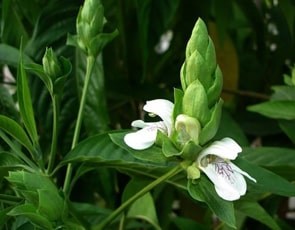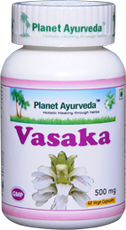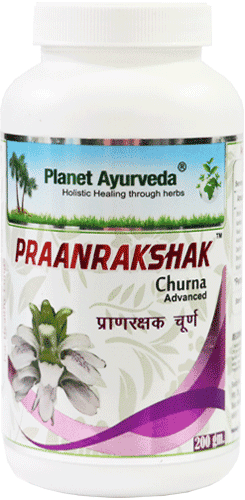Vasaka, Malabar nut (Adhatoda Vasica) – Uses, Benefits, Dosage and Properties

Plant Description
Vasaka is tall, dense, evergreen herbaceous shrub. Trunk of this shrub has numerous, long, opposite and ascending branches. This plant contains yellow colored bark. Leaves are lance shaped, oppositely arranged and smooth edged with short petioles. Leaves are bitter tasting and when dried color changes to dull brownish green. The leaves are rich in alkaloid compound vasicine. Inflorescence show dense, large and auxiliary spikes and flowers are usually white and purple in color. Fruits are pubescent with club shaped capsules.
General Information
Vasa, also known as Vasaka, is herb naturally known to be very effective in the management of respiratory problems like cough, cold & asthma etc. It is also a potent anti – microbial agent and has many cooling properties as well.
Vasicine is one of the active extracts obtained from this plant which gives this herb many medicinal properties.
For its remarkable action as a natural expectorant, vasa is found to be very effective in the management of many respiratory system disorders and may even bring relief for many patients of Tuberculosis.
Despite its great medicinal value, over dosage of its herbal extract may lead to many ill effects and therefore, it should only be used under medical supervision.
Vasicine is one of the many compounds extracted from this plant and is studied for its anti – microbial, anti – ulcer, hepatoprotective and anti – oxidant activity.
Other chemicals present in this herb are Vascicinine, Luteolin, Tritriacontane, Carotene, Vasakin, Vasicinone, Vascicolone, Vasicolinone etc.
Habitat
It is a very common herbaceous plant in India and grows in most parts of the Indian subcontinent. This herb is also distributed throughout Sri Lanka, Nepal, Pakistan, Indonesia, Malaysia and China, as well in panama.
Classification
- Kingdom – Plantae
- Order – Lamiales
- Family – Acanthaceae
Names
- Sanskrit – Vasaka
- Latin name – Adhatoda vasica
- English – Malabar nut
- Hindi – Adusa, Arusha, Bansa
- Telugu – Vasa, Addasaramu, Adamkabu
- Tamil name – Adhathodai
- Marathi – Adulsa
- Gujarati name – Araduso, Adulso
- Kannada name – Adusogae, Adu muttada soppu
- Bengali name – Adusa, Bakash, Vasok
- Punjabi name – Vamsa, Bhekkar
- Nepali name – Asuro, Kalo, Vasak
- Oriya name – Basanga, Arusa, Basung
- Assamese name – Titabahak, Bahak
- Konkani name – Adusoge
- Persian name – Bansa
Ayurvedic Properties
| Hindi / Sanskrit | English | ||
| Rasa | Kashaya, Tikta | Taste | Astringent, Bitter |
| Guna | Laghu, Rooksha | Physical Property | Light, Dry |
| Virya | Sheet | Potency | Cold |
| Vipaka | Katu | Metabolic Property (After Digestion) |
Pungent |
Effects on Doshas
It balances Pitta and Kapha doshas.
| Charak Samhita | Sushrut Samhita |
|
Daruvadi gana |
Ancient Verse about Adhatoda vasica

Vasako, vasika, vasa, bhishangmata, sinhika, sinhasya, vajidanta, aatrush, aatrushak, vrish, tamr and sinhparn all are various Sanskrit names of this herb. It is very beneficial for voice. This herb is bitter and astringent in taste, cardiac tonic, light and have cold potency. It is used in various disorders like bleeding disorders, thirst, asthma, cough, fever, vomiting, diabetes, leprosy and tuberculosis.
Practical Uses of Adhatoda vasica
- Vasa is a coolant herb with a pungent taste but has very effective action in relieving burning sensation and raised pitta in the body.
- It is found to be very effective in treating blood disorders and bleeding conditions. The herb is a great blood purifier as well.
- Another special action of this herb is in controlling vomiting. Vasa is also able to control fever especially pittaj fever (due to imbalance of the pitta dosha in the body) and its associated complications.
- It is also heart tonic and good for overall cardiac health.
- Vasa owes its popularity due to its major action on the respiratory system. Problems like chronic bronchitis, common cold and cough etc. are effectively managed by vasa.
- The herb is also effective for the liver and gall bladder as well. It can positively affect bile secretions due its pitta balancing properties, According to Ayurveda, gall bladder and liver are the seats of Pitta energy in the body.
- Among other actions, Vasa has a mild anti–inflammatory action, anti-microbial activity and skin protective action.
- Being expectorant this herb expels out all the phlegm accumulated in lungs and helps to treat cough and asthma. This herb is very beneficial in early stages of tuberculosis.
- The herb is used in removal of interstitial parasites. Decoction of this herb is used in worm infestation.
- Warm decoction of leaves treat skin disorders and scabies. Externally poultice of leaves of this herb is applied over skin to heal wounds, to reduce inflammation and in rheumatic pain.
- It is a mild sedative and used in calming of mind and to relieve stress.
- This herb helps in relaxing abdominal muscles and reduces abdominal pain.
- It is also very effective for the sufferers of sinusitis, post nasal dip, throat pain and tonsillitis.
- Decoction of Vasaka helps in reducing urea level and other nitrogenous wastes from the blood.
- It pacifies kapha and pitta dosha.
Part Used
- Leaf
- Root
- Flower
- Whole plant
Dosage
- Leaf Extract : 10-20 ml
- Root Decoction : 40-80 ml
- Flower Juice : 10-20 ml
- Liquid extract : 2-5 ml
Caution
Despite its great medicinal value, over dosage of its herbal extract may lead to many ill effects and therefore, it should only be used under medical supervision.
Ayurvedic Products from Adhatoda vasica by Planet Ayurveda
1. Vasaka Capsules
Vasaka capsule, a pure 100 percent natural health supplement formed from standardized extracts of pure quality herb Vasaka that is known Malabar nut with botanical name Adhatoda vasica. It is widely used herb in respiratory tract infections like cough, cold, asthma, rhinitis, sinusitis etc. This has effective results in tuberculosis, stomach upset and different skin disorders too.
2. Praanrakshak Churna
Praanrakshak Churna is a useful combination of anti-allergy herbs used in Ayurveda since 5000 B.C. for asthma and allergy. These herbs act together in a synergistic manner and are effective in chronic allergies, respiratory tract infections, chronic bronchitis and asthma. The herbs Bharangi, Kantkari and Shirish act as powerful antihistaminic and are effective in treating acute and chronic asthmatic attacks. These herbs Vasaka and Madhuyashti break the mucous plugs and are useful even in common cough, bleeding while coughing and also heals the inflamed respiratory tract. Tylophora asthmatica as the name indicates is another useful herb in treating asthma.





